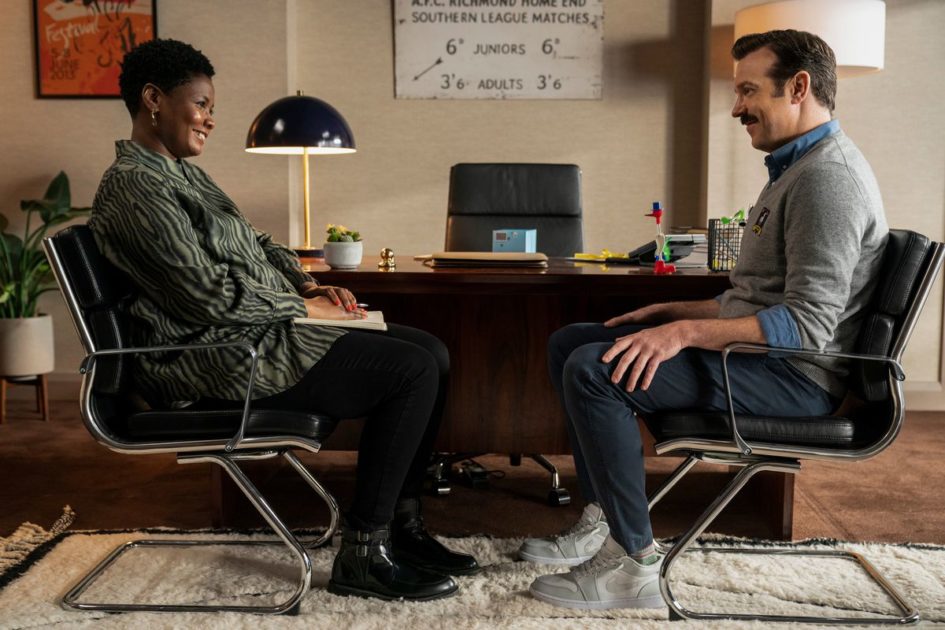
Photo credit: Ted Lasso
There are a lot of reasons you should be watching the Apple TV+ breakout hit Ted Lasso. The critical acclaim. The optimism. The unanimous appeal of Roy Kent. But one of the biggest reasons is the show’s timeliness. While the series first premiered at a time when culturally we all needed a little bit of joy and comfort (read: during peak quarantine), it’s relevance now has only grown as issues of mental health and athletes have collectively entered the cultural zeitgeist.
Whether it was Naomi Osaka withdrawing from the French Open to focus on her mental health, or Simone Biles not competing during certain events at the Tokyo Olympics, we’re seeing more and more athletes speak up, and speak out, about the importance of mental health—something Season 2 of Ted Lasso has put the spotlight on as well.
Sure, the most recent season still has all the things we love about the show—perfectly obscure pop culture references, an emphasis on kindness and positivity, and characters who aren’t afraid to be vulnerable. But it’s that last ideal that has been taken to new heights. With the introduction of Dr. Sharon Fieldstone, a sports psychologist played by the brilliant Sarah Niles, the show has beautifully—and authentically— explored the power of therapy.
While the show has always had a knack for showing the power of vulnerability, we hadn’t really seen it in terms of wellness and self-care. We got glimpses in Season 1 as Ted suffered from a panic attack during a night out doing Karaoke, but we never got much insight as to the why. What caused it? Was this his first one? Is he going to be okay? These questions have been on viewer’s minds as they continued watching Ted spread his one-of-a-kind brand of positivity, while deep down knowing something wasn’t quite right. Then, a second panic attack in Season 2 causes Ted to leave a match, and most viewers were positive Ted was going to speak up. This is a man who preaches authenticity and vulnerability after all. But instead of speaking his truth, he lies and tells the world it was just food poisoning, when the reality is he ended up in the fetal position on Dr. Sharon’s couch.
This leads to Ted removing some of his “general apprehension and Midwestern skepticism” to therapy and deciding to give it a try. The sessions consist of a lot of false-starts as Ted struggles to let his guard down with Dr. Sharon. That is until a post-game conversation between Jamie Tart (doo-doo-doo-doo-doo-doo!) and his father that changes everything.
After a tough loss, Jamie’s dad shows up—drunk and belligerent—and does everything in his power to belittle and demean his son. In an amazing bit of acting from Sudeikis you watch as he looks on in horror and hurt as this father unapologetically berates his kid for, well, being human. But because this is Ted Lasso, you also witness the beauty and growth that can come from life’s painful moments. Roy, who for all intents and purposes has been Tart’s nemesis, rushes towards him and locks him in an heartwarming embrace. Ted, who up until this point had been reluctant to open up, calls Dr. Sharon and gives her, and us, a peek behind his optimistic armor: his father committed suicide when he was just 16 years old. For the first time you see him acknowledge the trauma he experienced, but also the fact that he has yet to really deal with it. Both scenes are gut-wrenching to watch, but feel fully earned by viewers who have gone on these journeys of growth with these characters for 15 episodes.
Above all, though, the scenes show the power and strength that comes from being open to change and evolution. If you would’ve told viewers that Roy Kent would be there for Jamie Tart in his time of need, or that the ever-optimistic Ted Lasso suffered such a tragedy, you’d be reluctant to believe it. But because these characters took the time to put in the work; to trust in the process, they’re able to embark on a path towards healing. That’s why it’s been really inspiring to see this emphasis on mental health make headlines—both in real life and on the show. For so many, athletes are just commodities and sure, professional sports is a business, but at the end of the day athletes are just people. Yes, people who can do extraordinary things, but that doesn’t make them any less human. As a culture, it’s not breaking news to say we idolize athletes, but as a culture it seems we are just beginning to realize that often times, that comes at a price. The unique pressure and expectations, the lifestyle and its sacrifices, the comments and critiques, it’d be impossible for them to not take a toll. Because getting paid to kick or serve a ball doesn’t exempt you from the world feeling overwhelming. That’s why it’s so refreshing to see these topics being talked about; it reminds us that we are all human, but also that we’re not alone.
The series obviously could’ve never predicted the way sports and mental health would enter the cultural consciousness at the time of its airing, but you can’t help but see it as another example of kismet. Much like Season 1 of Ted Lasso gave so many viewers what we needed during an insanely isolating time —community, hope, joy— Season 2 is giving so many of us what we need as we (hopefully) come out of it: the permission to feel our feelings and share them with the world.

